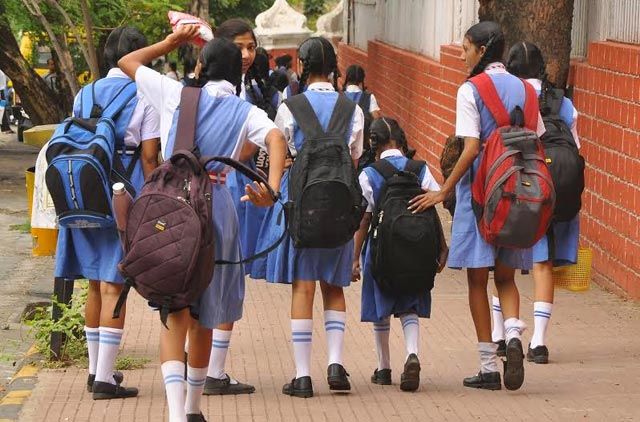https://www.thenewsminute.com/article/overloaded-bags-no-school-bags-one-school-down-many-more-go-39707
The Telegraph, Calcutta
22 April 2018
 The report below in today's Telegraph is a sad commentary on the state of education in our schools today. It is pure business of pushing bulky books, along with private tuitions instead of Remedial Classes. It's a big business deal (commission) between various school boards and their publishers, including publication and pushing of books written by some board members and members of their family. Royalty matters more than the lives of students! For this Royalty, every year students of a Delhi-based Board which has 450+ affiliated schools in West Bengal, are made to buy new books, even for a change of a few pages and pictures here and there. Why can't schools give a printout of the few changes in the text books? There is no immediate escape from this torture of students as the report in today's Telegraph Calcutta says. Yesterday there was a Career Counselling programme held at Don Bosco School Kolkata, under the aegies of Catholic Teachers' Guild, Archdiocese of Calcutta. Today there was another similar programme at Christ the King Church Kolkata. The difference was in the latter programme even the parents were invited for counselling – something very novel and desirable, for it is the parents who get more hyper tensed than their wards about their future career path. But did any of these Career Counselling programmes raise the problem of bulky school bags heavy with unnecessary books? They just overlooked the issue. It is as if students are being made to carry their cross day in and day out.
The report below in today's Telegraph is a sad commentary on the state of education in our schools today. It is pure business of pushing bulky books, along with private tuitions instead of Remedial Classes. It's a big business deal (commission) between various school boards and their publishers, including publication and pushing of books written by some board members and members of their family. Royalty matters more than the lives of students! For this Royalty, every year students of a Delhi-based Board which has 450+ affiliated schools in West Bengal, are made to buy new books, even for a change of a few pages and pictures here and there. Why can't schools give a printout of the few changes in the text books? There is no immediate escape from this torture of students as the report in today's Telegraph Calcutta says. Yesterday there was a Career Counselling programme held at Don Bosco School Kolkata, under the aegies of Catholic Teachers' Guild, Archdiocese of Calcutta. Today there was another similar programme at Christ the King Church Kolkata. The difference was in the latter programme even the parents were invited for counselling – something very novel and desirable, for it is the parents who get more hyper tensed than their wards about their future career path. But did any of these Career Counselling programmes raise the problem of bulky school bags heavy with unnecessary books? They just overlooked the issue. It is as if students are being made to carry their cross day in and day out.
Readers may refer to the link above to read a report in the News Minute dated 2nd March 2016, on how the Punalur Tholicode Lower Primary School in Kollam district in Kerala has introduced a no-school bag policy to ensure that students learn without any physical stress.
Here’s how the policy works:
-
Students will be given two sets of text books, one for home and one for school.
-
Classrooms will have shelves to keep the text books.
-
The note books they carry to school will have just 40 pages, hence lighter.
-
Kids will be given cloth bags to carry them to school.
-
Students will also be given food and water in school.
Isaac Gomes, Associate Editor, Church Citizens' Voice.
|
No homework would make childhood idyllic. But is that the reality in today's India? The National Curriculum Framework-2005, formulated by the National Council of Educational Research and Training, recommends that no homework should be given to children up to Class II and only two hours of homework a week to children in Classes III and IV. The NCF-2005 also states that just language and mathematics should be taught in Classes I and II: so children need not carry more than two books. The ideals behind the framework include lightening the burden of learning and a movement away from rote learning to lessons that connect with experiences outside the classroom. It is a pity that such a thoughtful framework does not mention curiosity and critical thinking as goals of learning. Although the NCERT's directions are only for schools under the Central Board of Secondary Education, such principles can be followed in all schools.
That this is not the case, allegedly even in CBSE schools, was the subject of the writ petition filed in the Madras High Court, which claimed that too many subjects were being dumped on children, leading to stress. It is in answer to this that the NCERT referred to the NCF-2005, and said that all states and Union territories had been made aware of its requirements.
Light-hearted, fancy-free children are difficult to find in India, even among CBSE school pupils. However simple the 2005 framework's requirements sound, the hurdles to achieving them are tough ones. Few schools in the whole of the country would be able to hire teachers who have the dedication and know-how to instil all lessons in class with adequate practice and revision, while discouraging rote learning. It is no secret that there is a heavy dependence on private tutors from the lowest Classes. Many schools make it part of their policy not to admit children whose parents cannot oversee their work at home. This assumes homework. The framework also lays emphasis on physical exercises. How many schools have proper playgrounds? Including yoga, the flavour of the present five years, does not address the problem of either space or the energetic exertion that children require.
To achieve the goals suggested by the framework, institutions must work in coordination.

Just as schools must have playgrounds, so teachers must know precisely what to do. But beyond all this lies the obstacle posed by ambitious or anxious parents. For vast numbers of them, private tuition is a necessity from pre-school days, first to gain admission to a school of choice and then to keep excelling till a future is assured. In pursuit of this elusive goal, playtime after school has almost vanished even if there is little or no homework from school. First-generation schoolgoers may find extra tuition unavoidable, but tutors are not employed by their parents alone. Parents must also help to ensure that learning is not burdensome for impressionable young minds.
A childhood with no homework would be idyllic, but that, in spite of the efforts of the NCERT, is far from the reality of today's India
|
|
|
|
|

 The report below in today's Telegraph is a sad commentary on the state of education in our schools today. It is pure business of pushing bulky books, along with private tuitions instead of Remedial Classes. It's a big business deal (commission) between various school boards and their publishers, including publication and pushing of books written by some board members and members of their family. Royalty matters more than the lives of students! For this Royalty, every year students of a Delhi-based Board which has 450+ affiliated schools in West Bengal, are made to buy new books, even for a change of a few pages and pictures here and there. Why can't schools give a printout of the few changes in the text books? There is no immediate escape from this torture of students as the report in today's Telegraph Calcutta says. Yesterday there was a Career Counselling programme held at Don Bosco School Kolkata, under the aegies of Catholic Teachers' Guild, Archdiocese of Calcutta. Today there was another similar programme at Christ the King Church Kolkata. The difference was in the latter programme even the parents were invited for counselling – something very novel and desirable, for it is the parents who get more hyper tensed than their wards about their future career path. But did any of these Career Counselling programmes raise the problem of bulky school bags heavy with unnecessary books? They just overlooked the issue. It is as if students are being made to carry their cross day in and day out.
The report below in today's Telegraph is a sad commentary on the state of education in our schools today. It is pure business of pushing bulky books, along with private tuitions instead of Remedial Classes. It's a big business deal (commission) between various school boards and their publishers, including publication and pushing of books written by some board members and members of their family. Royalty matters more than the lives of students! For this Royalty, every year students of a Delhi-based Board which has 450+ affiliated schools in West Bengal, are made to buy new books, even for a change of a few pages and pictures here and there. Why can't schools give a printout of the few changes in the text books? There is no immediate escape from this torture of students as the report in today's Telegraph Calcutta says. Yesterday there was a Career Counselling programme held at Don Bosco School Kolkata, under the aegies of Catholic Teachers' Guild, Archdiocese of Calcutta. Today there was another similar programme at Christ the King Church Kolkata. The difference was in the latter programme even the parents were invited for counselling – something very novel and desirable, for it is the parents who get more hyper tensed than their wards about their future career path. But did any of these Career Counselling programmes raise the problem of bulky school bags heavy with unnecessary books? They just overlooked the issue. It is as if students are being made to carry their cross day in and day out.


















Non-education in India.
Let me look back at the education of my two sons.
In the 1970s, myself and my family were residing at Chembur in Mumbai near OLPS school. When I sought admission for the LKG for my first son, the comment of the Principal was “Why waste the money and wait for admission to the 1st Standard”. Since I showed interest in LKG, the only question asked of my son was “What is your name, Sunny?” On approaching for LKG admission for my second son, the same comment of the Principal and admittance without any question.
On my shifting residence to Santacruz West, admission to the 1st Standard at the Sacred Heart School was rather easy but for the 3rd Standard was tricky. But l insisted on my first son also to be educated at the same school and the Principal obliged. The only subject for which tuition given was Marathi, in which my son stood second in the class.
On my transfer to Trivandrum in August 1981, Loyola School with a well-known educationist C. P. Varkey S.J. as Principal obliged. Fortunately during the educational careers of my sons, no donation was required to be paid . My first son has M.B.B.S. from Trivandrum Medical College and M.D. from R.C.C. Trivandrum and the second one B.Tech from IIT Chennai and PGDM from IIM Calcutta.
Instead of clamouring for ranks and marks, what may be ideal is all-round development of a child, extra-curricular activities such as sports, music, painting, public speaking, group activities. I still remember C. P. Varkey’s observation “My best students are voracious readers”.
The situation of the educational institutions run by the Zero Malabar Church has reached the lowest depth of corruption, favouritism, cronyism and what not! Ethics and moral behaviour is confined to ritualism and obedience to the arbitrary diktats of the clerics.
God, if any, save the faithful “goats/cattle”. Luckily my sons and their families have escaped from the “DOGS Own Country” and this Mad Mad part of the World.
Varghese Pamplanil
I remember my childhood experience of learning. I had no tutor outside school. I had no heavy books to carry. I walked down the school that was nearly 5 KMs from my home. There were no changes in the syllabus and books so often as these days. All my brothers read the same books to pass their exams in turn year after year. I remember those deep down values from my parents and my teachers in school. My headmaster was a true friend philosopher and guide. In today’s world of learning Education has become business to make profit and tie heavy loads to poor who are unable to compete in this rat race of success. The system of education should learn more from our ancient gurukul system of education where books were not that important but learning from life was stressed more. Teacher was a model for learning. May God save our learning factories!